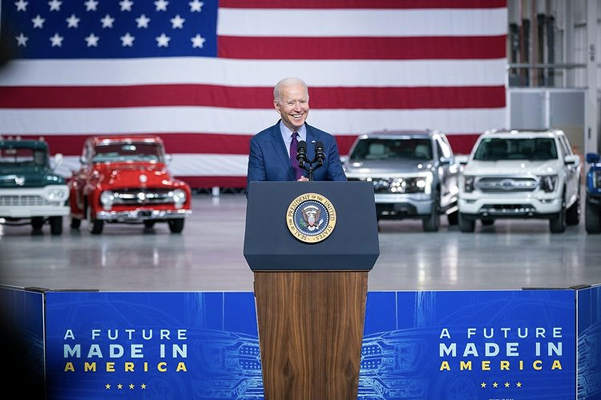Executive
The EV Tax Credit Is a Climate Lemon

The Inflation Reduction Act’s consumer tax credit for electric vehicles (EVs) is a fiscal blowout and a gift to Chinese mineral companies. If that isn’t bad enough, it also swindles American taxpayers into paying up to $821 per ton of avoided emissions, which is several multiples above the Biden Administration’s own estimates of the cost of carbon. At that staggering price, the scheme is a spectacularly inefficient way to reduce emissions.
How the EV tax credit works
Through the so-called Inflation Reduction Act, taxpayers subsidize the purchase of new electric vehicles by up to $7,500. But how many tons of carbon emissions does that actually stop from reaching the atmosphere? Compared to a conventional vehicle, the International Energy Agency estimates that using an EV avoids the equivalent of around 22.24 tons of carbon dioxide across its lifecycle. This means that the EV tax credit costs around $337 to avoid each ton of carbon emissions.
However, the true cost is actually higher because proper accounting should exclude EV consumers who would buy electric vehicles regardless of the tax credit. Because the tax credit doesn’t sway those consumers, the associated avoided emissions shouldn’t be attributed to the credit. The credit has the same $7,500 value, but the scheme is actually avoiding fewer carbon emissions, so the price per ton is higher.
According to a 2021 study published by the National Bureau of Economic Research, 70% of consumers who claimed the federal EV tax credit would have done so in its absence, which would imply a $1,123 implicit cost of carbon. Since then, the Inflation Reduction Act introduced new conditions on the tax credit, including limits on eligibility for high-income buyers. Even if one generously assumes that the remaining pool of very motivated buyers is only half the size — meaning only 35% would purchase an EV without it — then the implicit cost of carbon is still $519 per ton.
Fuel efficiency standards
The federal splurge on carbon gets a further boost thanks to President Biden’s onerous fuel efficiency standards. Mandating higher fuel efficiency means that a shift from a conventional vehicle to an EV has less of an effect in terms of avoided emissions. In May 2022, the Department of Transportation mandated that new cars on the roads in 2026 be 33% more fuel efficient than the 2021 standards. When consumers choose EVs over these more efficient gas-fueled vehicles, the implicit price of carbon within the EV credit jumps to $775. As the Biden Administration progressively ratchets these efficiency standards higher, so too goes the implicit price on carbon. By 2031, federal taxpayers will be forking over the equivalent of $821 for each ton of carbon the EV tax credit prevents from reaching the atmosphere.
Frittering away more than $800 for a ton of carbon is a rip-off that not even the most unscrupulous used car salesman could dream up. Compare this figure to recent estimates of the “social cost of carbon,” which the federal government uses to quantify the impact of emissions when making regulatory decisions. While the Trump Administration estimated it to be between $1 to $7 per ton, the Biden Administration blew the roof off in 2023 by raising that cost to $190. That progressive overstatement now looks like a steal.
A wasteful spending spree
Even within the Inflation Reduction Act’s tax and spend circus, the EV tax credit is a spectacularly wasteful way to reduce carbon emissions. For example, the natural gas tax, which solely punishes the oil and gas industry under a thin guise of environmentalism, levies a fee equivalent to $36 per ton of carbon. Meanwhile, the tax credit for vacuuming emissions out of the air is worth up to $180 per ton. These dramatically different prices, even within a single act of Congress, underscore the practical futility of calculating an efficient price on carbon for a carbon tax or tariff.
Progressives like to measure the success of their policies by how much taxpayer money they can burn through, and the White House periodically reminds taxpayers that the Inflation Reduction Act is the largest single climate spending spree in human history. What they don’t mention is that the American public is being ripped off at the car lot with a climate lemon of a tax credit.
This article was originally published by RealClearEnergy and made available via RealClearWire.
Oliver McPherson-Smith, Ph.D., is the Director of the Center for Energy & Environment at the America First Policy Institute and a research fellow at Stanford University’s Hoover Institution.
-

 Accountability3 days ago
Accountability3 days agoWaste of the Day: Principal Bought Lobster with School Funds
-

 Civilization7 hours ago
Civilization7 hours agoWhy Europe Shouldn’t Be Upset at Trump’s Venezuelan Actions
-

 Executive1 day ago
Executive1 day agoHow Relaxed COVID-Era Rules Fueled Minnesota’s Biggest Scam
-

 Constitution2 days ago
Constitution2 days agoTrump, Canada, and the Constitutional Problem Beneath the Bridge
-

 Civilization1 day ago
Civilization1 day agoThe End of Purple States and Competitive Districts
-

 Christianity Today7 hours ago
Christianity Today7 hours agoSurprising Revival: Gen Z Men & Highly Educated Lead Return to Religion
-

 Civilization5 days ago
Civilization5 days agoThe devil is in the details
-

 Executive20 hours ago
Executive20 hours agoWaste of the Day: Can You Hear Me Now?








